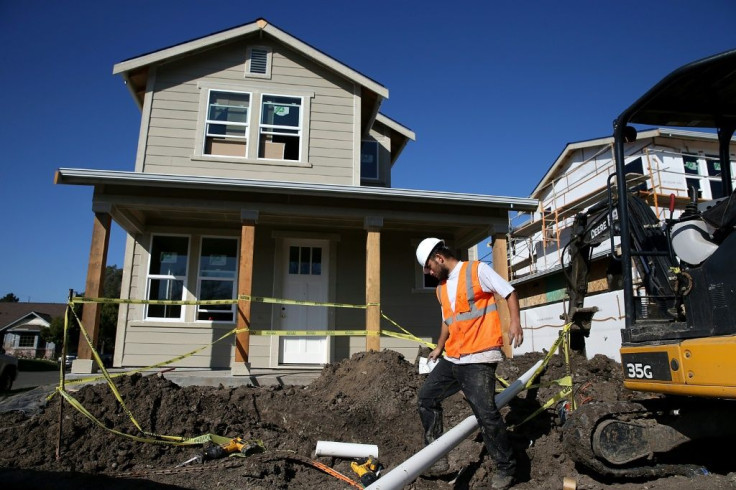As Fed Keeps Buying Mortgage-Backed Securities, What Will Happen To Mortgage Rates?

KEY POINTS
- The Federal Reserve has now purchased $1 trillion in mortgage-backed securities since March
- The Fed will own about $1.4 trillion in mortgage bonds by the end of the year
- 30-year mortgage rates have dropped to 2.91% from 3.3% in early February
The Federal Reserve has now purchased $1 trillion in mortgage-backed securities since initiating the program in March to help combat the impact of the COVID-19 pandemic on homeowners.
The central bank now owns nearly one-third of all bonds backed by home loans.
The Fed purchased about $300 billion of the mortgage bonds in both March and April, and has since bought them at a slower rate of about $100 billion per month.
The Fed is on pace to own about $1.4 trillion in mortgage bonds by the end of the year.
As a result of this buying frenzy, 30-year mortgage rates have dropped to 2.91% from 3.3% in early February. This decline has permitted homeowners to refinance their mortgages and allowed more people to buy homes.
But Bloomberg cautioned that as the Fed now owns so many home loans — and its balance sheet expands — it could conceivably shape and influence mortgage rates on its own.
Kevin Jackson, a managing director on the mortgage trading desk at Wells Fargo & Co., said the Fed buying so many home loans was a good idea.
“We had a pandemic arise and you needed a force to come into the market and stabilize things,” Jackson told Bloomberg.
Greg McBride, chief financial analyst at Bankrate, told International Business Times that the Fed stepping into the mortgage market in a big way back in March not only helped keep the market functioning but it has helped drive mortgage rates to all-time lows.
“The Fed remaining the dominant buyer will keep a lid on mortgage rates, but by itself is unlikely to keep driving rates lower,” McBride said. “Mortgage spreads are where they are due to add-on price adjustments from the [government-sponsored enterprises like Fannie Mae and Freddie Mac] and due to lender capacity, not for lack of demand in the mortgage-backed securities market.”
Holden Lewis, home and mortgage expert at NerdWallet, echoed the opinion that mortgage rates likely won't dip much further.
“Anyone with a steady job, a sufficient credit score and equity can refinance their mortgage, and the Fed's buying binge is one of the main reasons," Lewis told IBT. "The Fed keeps the money flowing, allowing homeowners to save money by refinancing, and that's a good thing for the economy. The central bank seems satisfied where mortgage rates are now, so I don't see the Fed trying to drive rates much lower."
Steve H. Hanke, a professor of applied economics at Johns Hopkins University in Baltimore who served on President Reagan's Council of Economic Advisers, told IB Times: “I do not view these mortgage-backed securities as a problem. They are a blessing. Indeed, they have stabilized the mortgage and housing markets. And, while stability might not be everything, everything is nothing without stability.”
But Peter Warden of Mortgage Reports said he thinks the Fed policies will keep mortgage rates low for years to come.
“Mortgage rates are determined by supply and demand in a ‘secondary market,’ where mortgage-backed securities are traded,” he wrote. “And, normally, the Fed gets no say in that market.”
However, Warden concedes the Fed has had a bigger influence on mortgage rates this year through its purchases of mortgage-backed securities.
“But that’s a temporary intervention and a distraction from normal principles,” he assured. “However, Federal Reserve policy changes do affect the overall mood of the market. And that can have an indirect effect on mortgage rates.”
Warden indicated that there is now a “general feeling” that the latest stances by the Fed are good for mortgage and refinance rates.
“Those in the process of buying or refinancing should not wait to lock a rate. Mortgage rates are already near record lows and not expected to drop much further,” he added. “[But] rates are likely to stay at or near their current levels for quite some time.”
Doug Whiteman at MoneyWise took another view.
Noting that mortgage rates have been hitting all-time lows since March, Whiteman said that “while mortgage rates are often influenced by what the central bank does, there's no direct connection. Instead, mortgage rates follow the interest, or yields, on long-term Treasury bonds. If the Fed's low [interest] rates cause inflation to rise, it will eat away at bond yields -- and investors will demand higher interest… Yields will increase, and mortgage rates will go up, too.”
© Copyright IBTimes 2025. All rights reserved.





















